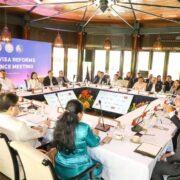 The Philippine Contractors Accreditation Board (PCAB) launched its online portal for renewing contractor’s license and relaxed its documentary requirements from 24 to just 9 digital submissions as a quick response for the COVID-19 pandemic situation.
The Philippine Contractors Accreditation Board (PCAB) launched its online portal for renewing contractor’s license and relaxed its documentary requirements from 24 to just 9 digital submissions as a quick response for the COVID-19 pandemic situation.
This new system makes construction license renewal more accessible 24/7 through the internet, without the need for firms to visit the PCAB office and or any regional window. PCAB Chairman Dr. Pericles Dakay said, “this will be a great relief for around 15,000 contractors of our country, 90% of which are small and medium enterprises, who can immediately renew their licenses before 30 June, the expiration date of all licenses according to the law.”
Construction Industry and its crucial role in PH Economy
The Department of Trade and Industry (DTI) Secretary Ramon Lopez noted that “the construction industry has always generated the greatest number of additional jobs in the last decade. In 2016 to 2019 alone, through the flagship Build, Build, Build Program of the Duterte Administration, the industry added around 800 thousand jobs to hit the current level of 4.2 million, accounting for 10% of the workforce in 2019.”
The construction industry is one of most important sectors of the economy. Secretary Lopez further expounds that “This is why government services, such as licensing, should work for businesses, most especially with the construction industry that can create a large impact and huge multiplier effect for all of us. Making the renewal system online is always the ultimate form of ease-of-doing-business (EODB)”
Construction spending accounts for about 17% of the gross domestic product (GDP) and grew the fastest among all business sectors at more than 10% average annual growth rate in recent years. However, the COVID-19 pandemic’s economic disruption has caused the construction industry to significantly slowdown, and with it, the Philippines’ GDP dived to its decade’s low of -0.2%.
Dr. Dakay underscored that “given the importance of the construction industry should be at the forefront in the post-COVID economic recovery” of the Philippines. A crucial part of the country’s economic recovery initiative is galvanizing its public infrastructure spending through its Build, Build, Build and stimulating its construction industry starting with the crucial first step of an improved, simpler, and faster licensing system for construction firms.

24 to 9… Renew Online
The current Contractor’s License Law (RA 4566) and its implementing rules and regulations (IRR) have at least 24 documentary requirements for PCAB license renewal. Due to the COVID-19 situation, the Board has reduced, consolidated, and simplified these requirements after a quick series of review, dialogues and consultations with industry players and partners. These include the Philippine Constructors’ Association (PCA), Davao Constructors Association Center Inc. (DCACI), Cebu Contractors’ Association (CCA), and the National Constructors’ Association of the Philippines, Inc. (NACAP).
Within three-weeks’ time, PCAB, with the technical support from the United States Agency for International Development (USAID), and its partners and consultants collaborated in revisiting the Contractor’s Law and in conducting comparative analysis and benchmarking of licensing international best practices. As a result, PCAB has reduced the previous 24 documentary requirements down to only nine (9) digital submissions.
Personal appearances for mandated interviews will also be done through a digital platform. Electronic payment is available through Land Bank’s LinkBizPortal. When submissions are completed and payment is made, the evaluation and approval will also be conducted online, which are expected to reduce the processing time. Furthermore, when renewal application is approved, the license will be accessible to the contractor digitally as well.
PCAB’s online portal also features a feedback form for users to quickly provide their comments and experience for the system’s continued improvement. Additionally, PCAB is continuously working to automate the rest of its other transactions such as new applications for license, upgrading of license category, and consortium and JV applications. More e-payment facilities are expected to be connected in the coming weeks for faster and more convenient transactions.
A pivotal element of Construction Industry Roadmap 2020-2030
On 8 January of this year, the DTI-Construction Industry Authority of the Philippines (CIAP), together with the PCA, and all relevant stakeholders, expressed its commitment to work on 30 Action Plans for the next 10 years. This is to realize the full economic and employment potential of the construction industry and achieve their vision that they have declared in the Philippine Construction Industry Roadmap 2020-2030: Global Partners in Building Nations.
One important action agenda is the modernization of the services across the whole organizational umbrella of the DTI-CIAP, and a large part of that is the simplification and automation of contractor’s license applications.
Streamlined processes beyond COVID-19 situation
This portal is initially a response to health protocols avoiding person-to-person contact for COVID-19 prevention. But more importantly, Dr. Dakay explained that “it is a big step towards improving our PCAB’s compliance with the Ease-of-Doing-Business Law, modernizing the whole licensing processes even beyond the pandemic situation.” Currently, there are about 58,000 government infrastructure contracts and 75,000 private construction contracts in demand annually. The PCA noted that the country needs at least 20,000 licensed contractors to address the pressing demand. PCAB’s effort to simplify the licensing system and making processes seamless provides greater opportunity of encouraging more quality constructing firms to be licensed, and therefore, fulfilling more construction contracts that lead to improved economic activities that are crucial for the Philippines’ economic recovery.
—
Stay updated with news and information from the Department of Trade and Industry by visiting their website at dti.gov.ph.






